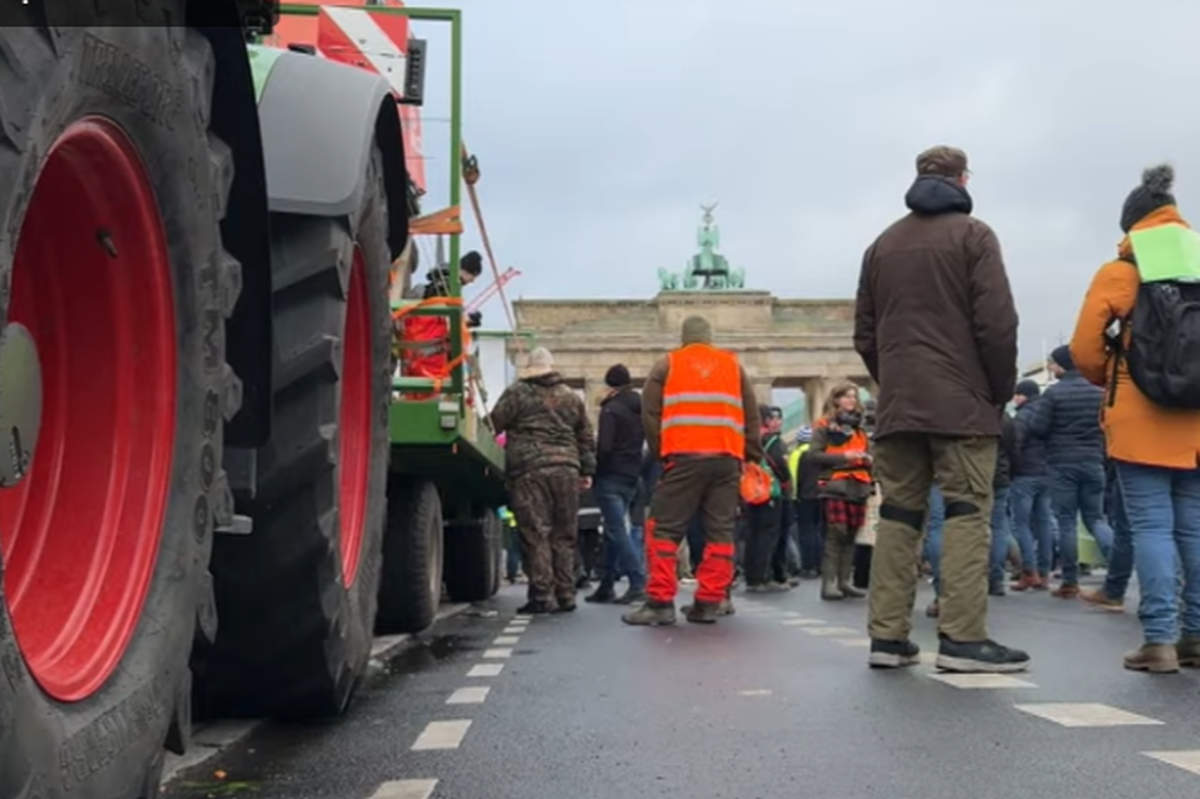Farmers end a week of protests against the federal government’s austerity measures. Other sectors have also joined in. The German economy is shaking on its foundations.
Thousands of tractors and trucks converged on Berlin this Monday, January 15, 2024, at the end of a week of actions in all the Länder. In front of the Brandenburg Gate, a crowd of farmers greeted Finance Minister Christian Lindner with boos. On vehicles parked along Berlin’s main avenue Unter den Linden, many placards expressed their defiance of Olaf Scholz’s tripartite coalition, dubbed the “traffic light” because of the colors symbolizing the parties that make it up: the Social Democratic Party, SPD, whose color is red, the Liberal Democratic Party, FDP, whose color is yellow, and Alliance 90/The Greens, whose color is green.
Against austerity policy
Farmers are refusing to accept the government’s austerity policy, as demonstrated by the cut in public subsidies for diesel fuel. They have been joined by restaurateurs, hauliers and many craftsmen who are also protesting against the austerity measures. On Monday, the Federal Association of SMEs explained that “SMEs are in solidarity with each other, and farmers are SMEs too”. All are denouncing the coalition government’s policies. And they fear the effects of globalization due to massive imports of low-cost products.
Hauliers and truck drivers
The tractor parades that have brought Germany to a standstill for several weeks have made many small-scale businesses realize that they are in the same boat as farmers. The agricultural unrest has spread to the political arena.
The German Federation of Road Transport, Logistics and Waste Disposal (BGL) is taking part in the demonstrations with hauliers and truck drivers, and is opposed to a double CO2 charge for tolls, plus the price of diesel.
The BGL estimates the additional costs generated by the CO2 surcharge on the HGV toll on December 1ᵉʳ, 2023, at around €3.75 billion for the current year. To this would be added an estimated €1.44 billion due to the increase in the CO2 tax during 2024, which will rise from €30 to €45 per tonne of carbon dioxide and will be reflected in the price of fuel.
Last week, BGL president Dirk Engelhardt took offense: “Our business is paying twice at the moment. And we want the Ampel government to withdraw this double taxation.”
Fishermen penalized by wind farms
Fishermen on the North Sea coast are also protesting alongside farmers. They too are refusing to accept the abolition of agricultural diesel and the tax exemption for farm vehicles. The same applies to the increase in tolls, according to the fishermen’s trade association. Especially as fishermen have lost important fishing grounds due to the construction of wind farms in the North and Baltic Seas.
Restaurant owners in solidarity
Perhaps more than others, restaurateurs are associated with farmers and support their actions. “Together with the German Farmers’ Union, we are committed to keeping locally-produced food – and restaurant meals – affordable,” says Guido Zöllick, President of DEHOGA (the trade association for the hotel and catering industry). DEHOGA and 16 other associations are campaigning for a uniform 7% tax on meals.
The restaurateurs are particularly critical of the VAT increase on meals, as well as the removal of the brakes on electricity and gas prices, the increase in the CO2 tax and the new truck toll.
Craftsmen and traders
Tradesmen and craftsmen are sharply critical of the actions of the Ampel coalition. “The political dithering of recent weeks and months has caused our businesses to lose confidence in the future,” said Robert Wüst, President of the Brandenburg Association of Chambers of Crafts and Skilled Trades. Many craft businesses are disappointed by the federal government’s current policies. Bakers and butchers, in particular, fear that the abolition of subsidies for farmers will increase the cost of raw materials for their businesses.
Europe’s farmers under threat
In the end, it’s the entire German economy that is impacted by the drop in public subsidies and the rise in energy prices. Since the war between Russia and Ukraine and the halt to Russian oil and gas imports, prices have soared in Germany. Germany was 55% dependent on Russian gas and 35% on oil.
The economic crisis could quickly move into the political arena. And quickly spread to other countries. The whole of Europe is on the brink of chaos.
#Bauernproteste 🫶🏻👨🏻🌾🚜
🇩🇪 Tausende und Abertausende Landwirte, Lastwagenfahrer und andere hart arbeitende Menschen gingen heute in Berlin auf die Straße, um ihre Regierung und die Globalisten an eine einfache Sache zu erinnern: pic.twitter.com/P59CvFIL5z
— AldousHuxley (@AHuxley1963) January 15, 2024

